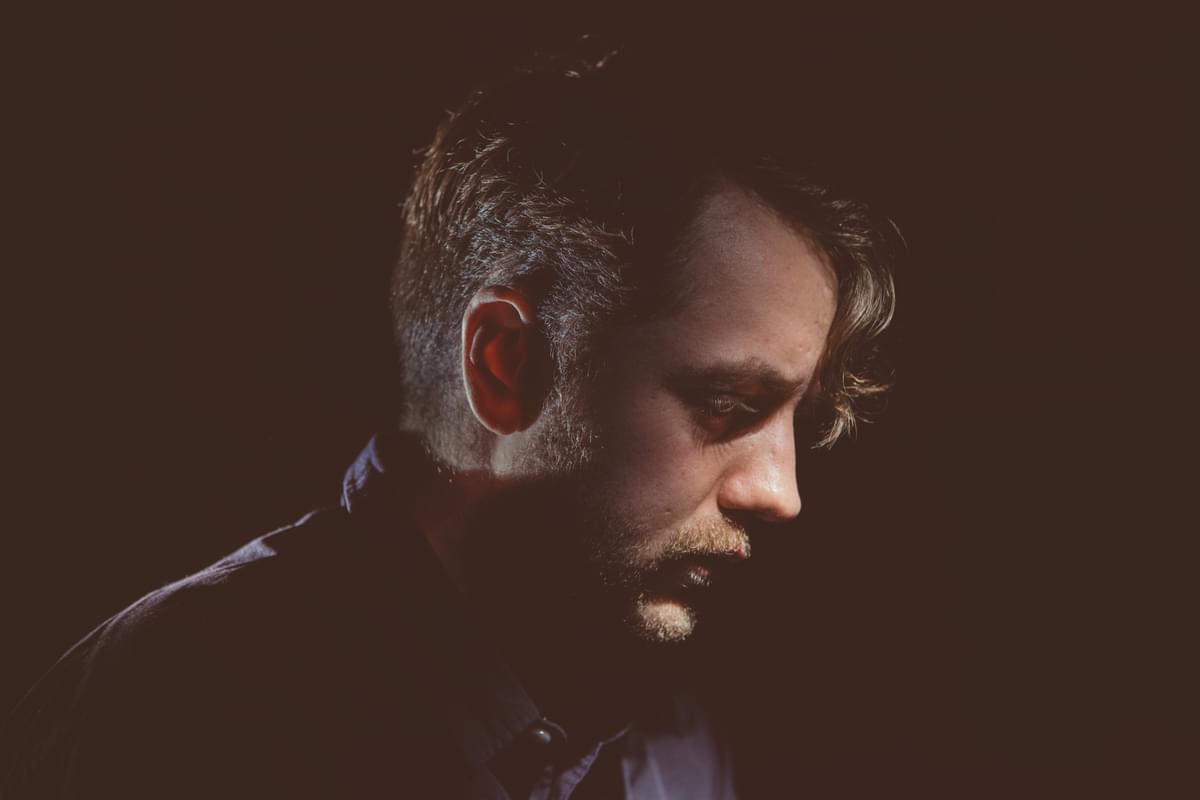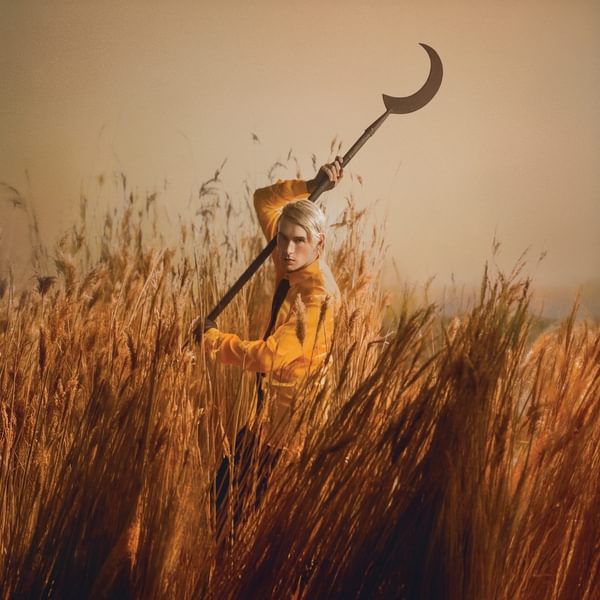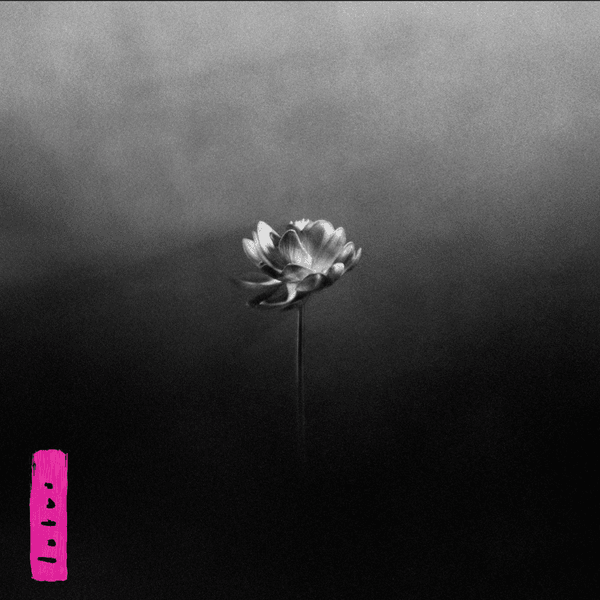
Rip It Up And Start Again
As Money release their second long-player, frontman Jamie Lee talks candidly to Paul Bridgewater about artistic frustration and communication in songwriting.
It’s hard to write about Jamie Lee in a way that’s detached. My early encounters with the Money frontman have historically involved all-night chats about poetry and death alongside a sizeable intake of alcohol. On one occasion he drenched me in charteuse and set fire to my arm.
That was almost two years ago. He’s mellowed since then, embracing sobriety alongside a move back to his native South London from Manchester. And while the conversations may have stayed the same, they're more likely to take place in coffee shops or over dinner. The Jamie Lee of 2016 is a very different beast from the man who used to think nothing of stripping naked for record covers. The notoriety that made the band's beginnings so compelling is now a distant memory. Lee has cleaned up his act and the result is one of the most nourishing records you’ll hear this year.
Suicide Songs is a highly crafted collection of tracks united by their dense themes and - significantly - a poetic contraposto. Spiritual disconnect alongside a deep belief in true love. A celebration of life framed by the ever-present threat of self-destruction. And overriding everything: a jubilant, raging euphoria.
It’s a record filled with life and while it doesn’t do anything to erode Lee’s status as an artistic outsider, it undoubtedly positions Money among Britain’s finest bands.
In almost three years of friendship I’ve seen him Lee constantly grapple with the need for authenticity and artistic perfection at every turn. It would be frustrating to hear someone demolish their own work so frequently if I wasn't convinced this is the key to his talent. He’s a man driven by a sometimes unhealthy chunk of self-doubt and anger. He’s never self-righteous - there’s a hyper-intelligent being beneath the layer of playfulness and jest.
I speak to Lee on a Friday night over dinner. It's a month or so before Suicide Songs is released and we hole up for a night of arguments, agitation and an attempt to understand just what it is that frustrates him about being a songwriter in 2016.
Paul Bridgewater: Jamie, what really matters when you write a song?
Jamie Lee: Being truthful or creating art. You can't be nice to everyone because that's not truthful is it? When you're having a conversation with someone you care about how they feel to some degree but when it comes to making art you can't worry about what other people feel. You hear about writers all the time who write about their family and get disowned because they're truthful...or they're giving their version of the truth at least. I'm not writing about my family but I'm writing about...everyone. I do worry about the negative effects of writing about life.
Paul: You're writing in a more abstract way though, in the context of a song, which usually makes it more generalised. You're trying to be the 'poet', passing wisdom, creating grand narratives, aren't you?
Jamie: I'm not writing close to the ground level unfortunately. But it depends on which song. [Of] the songs that we've released..."I'll Be The Night" is a song addressed to the listener. People think it's a love song but it's not. I hate talking about my own songs in this way...it's so self-indulgent. I don't know how I can be more clear though. This is what frustrates me and makes me so depressed. I feel I've been so clear in what I'm trying to say.
"I'm frustrated as a person but I'm choosing not to put that poison into my art"
Paul: How do you know that people haven't got what you're trying to say though? What's the indicator of that?
Jamie: They think it's a love song. Because that's what they've been trained to hear. People are trained to hear love in every piece of music they hear because people don't write about other things. I've chosen not to write about that because it's difficult to write about well but also because I just didn't want to write those kind of songs. I wanted to write about someone who is outside of life in every way because he or she doesn't engage with it without questioning it first.
Paul: But did you go away and use the knowledge of that expectation to deliberately subvert it, to be able to bring them round to your way of thinking? You're frustrated that people don't 'get' the songs but you've just admitted why that is...
Jamie: Is that my fault or their fault? It is someone's fault. It would be too preemptive of what you think other people think...with "I'll Be The Night"...I don't have a recognisable talent, I'm not gonna make a living out of what I do and I'm singing the song as the person who has to deal with that fact and not choosing to hate people because of it. I'm not saying "oh the world's shit cos it won't recognise my art"...
Paul: But that's sort of what you've said.
Jamie: No - I'm frustrated as a person but I'm choosing not to put that poison into my art. I probably should. It would make it better. As a person you can be perfectly fucking miserable but I do think that artists or people in general when they operate in the public eye they have some kind of responsibility that comes with what they do, talking to people in a group rather than one to one. When you create a song, it doesn't have to be the sum of your anger, you have to be...we're not saying the world is shit or the world is good [but] we're trying to create a warped beauty or sentiment because that's the only thing worth doing. You can stand behind something, find a cause worth fighting for, you can find something to disagree with but the only thing that's of any value really is finding some abstract beauty to observe.
Paul: I think your audience knows that.
Jamie: I don't think they do. They think we're making pretty music, they don't see anything deeper than that.
Paul: I don't agree. I think on a very basic level with Money, people see the warped beauty. Nobody thinks you're writing deep love songs..
.jpg&q=90&auto=format&w=792&fit=max)
Jamie: I think writers should be able to write about taking a bath. As a writer you have to find something to write about and once you can write about that you should choose something you can't write about. Great songwriters write about all sorts of things. Tom Waits and Bob Dylan have joke songs...
Paul: You can't just go to Waits and Dylan....
Jamie: Why? They've got shit as well.
[As we talk, Dylan's "Visions of Johanna" plays in the background...]
Jamie: Did you just put this on? I think I'm too particular, too forensic to be a good songwriter. Dylan just sometimes fucking rhymes. Tom Waits sometimes just fucking rhymes. I care too much about everything I'm saying. We have no connection with our fanbase.
Paul: But you've just made a huge judgement about them based on knowing what they think of you. It's not like you go out into the audience with a questionnaire.
Jamie: Maybe my songs affect the everyday person in a profound way but with my writing I want to be specific. Writing is about communication and if I don't feel that I've communicated when I've taken that time and effort to be specific then it's really depressing.
Paul: Are you taking the lack of a dialogue back at you as a sign that people don't understand you ?
Jamie: Yes. Nobody has said these are good songs yet. Nobody has said this is good songwriting. No-one has said that? Why is that?
Paul: There's been a positive reaction on Twitter...
"People's impressions of music are so fucking fickle. People don't listen to music."
Jamie: They haven't said they're well crafted songs, nothing has been said about the songwriting and that's what I've taken so much time over. They said "it sounds like this or that, another band". What's wrong with people? What does it take? People are told what to think about musicians and bands. Bands tend to be so fucking generic anyway. They fit into a mould. Do we fit into a mould? We probably do but not as much as other bands. They're primed with this language of reference. It pisses me off.
Paul: Look, I'm on your SoundCloud rightt now; there's comments like "This moved me, I love it".
Jamie: [incredulous] "This moved me!" Great. They've been primed to think we're an emotive band with nothing to offer.
Paul: Sandro from Germany says "Wunderschön!" Another guy says "awesome tune".
Jamie: Nobody says "great words". Why? The words are great. I know they're great. I know they are but no-one has picked up on that. No-one has asked me what the songs are about. Why did I write them? I don't understand.
Paul: But you're impatient! At this point you've put just two songs out ahead of this new album.
Jamie: When people hear Jake Bugg they say "he's a singer/songwriter cos he plays an acoustic guitar and he's called Jake Bugg". People's impressions of music are so fucking fickle. People don't listen to music.
Paul: I don't see you going online and making comments about great songs and great songwriting...
Jamie: That's cos I don't hear it anywhere!!!
Paul: Bob Dylan's SoundCloud?
Jamie: [laughs] "Great track Bob. This really moved me." If people are Money fans I think there's definitely something wrong with them [laughs].
Paul: What's your favourite band of the last few years Jamie?
Jamie: Women.
Paul: Have you been on their SoundCloud to tell them about it?
Jamie: No I haven't.
Paul: So you're as bad as the people you're criticising. Maybe Women are sat at home right now saying "I wish Jamie Lee would fucking tell us how good we are....we've been on the Money SoundCloud."
Jamie: People have responded to songs that haven't been released yet...like "Cocaine Christmas"
Paul: What are Money's albums about?
Jamie: The first record...I'd heard too much music and songwriting about love, the situation they found themselves in. It was always too recognisable. I didn't want to write about those things. I didn't want to touch on those things. They'd been trodden over before. I was reading a lot about spirituality. God is everywhere because death is everywhere.
Paul: It was about an interpretation of God in many ways, right?
Jamie: Yeh [but] I don't think songwriting can express those philosophical depths unfortunately. You have to do that with sound I think. We work with pop producers and you can't represent God with that. You have work with really strange people to do that.
.jpg&q=90&auto=format&w=792&fit=max)
Paul: Pop music tries to represent to concept of euphoria through melody thought, doesn't it? At one extreme you have the likes of Coldplay doing that in an albeit hamfisted way....and there's a sense of that with the new record.
Jamie: Yeh....I think I've been guilty of that. But don't fucking compare it to Coldplay. Compare it to "Jerusalem", Galaxie 500, even Daniel Johnston. Don't compare me to Coldplay. I thought you were my friend...
Paul: I think people who relate to those euphoric sweeps in music - the man or woman on the street will relate to that.
Jamie: Yeh I still have some hope for the man on the street. I think that's quite saintly of me, seriously.
Paul: You're so generous.
Jamie: That's my benevolence [laughs]. I could easily go another way, go into cynicism or make something gross or disgusting because I'm angry with the world. My political statement is: if every fucking avenue is tainted in some way the only thing we can hope for is some kind of sentiment which might not mean anything...some spectacle of beauty and that means listening to what the average man wants. Those melodies are from listening to what he wants and they rouse me. I think what I tried to do was take those melodies and put a cadence to it, a counterbalance - something sad or something hopeless.
Paul: That was sort of my point.
"The feeling that I would like to have is not being afraid of being alive anymore. Not being disturbed by the idea that we don't really know what we're doing here on this planet."
Jamie: It's the same with the writers I like. It's the accessibility but with a pay-off.
Paul: It's pop music.
Jamie: In the sense that if you measured it in terms of chords and melody, yes it is.
Paul: "I'm The Lord", "I'm Not Here", "Hopeless World"...those of the songs that grabbed me because of the melody.
Jamie: I feel bad that maybe that politic is quite mild. It's not radical or trying to be something bold. A record is rarely as good as a book. It's a collection of songs over time whereas a book is something more thought out and much more thorough. The record...it's romanticism, and that it can be okay. That hopefully there's a chance for beauty in some way and even if there isn't you have to believe that anyway. I know that's a cliche, this idea of beauty...I just wanted to be a better songwriter. I don't think people knew what I was writing about on the first record and that's my fault as a writer. That annoys me.
Paul: Thematically the first record feels more fragmented and the songs were more precise. To me it feels the other way round here. How does suicide fit into this as a theme. What does it represent?
Jamie: Self-destruction. Not wanting to engage in life. Finding life tainted at every level and being pained by that. About refusing to identify with what other people say life is about. Social suicide is about making yourself so anonymous you don't exist. I think I chased that because I wanted to see what I found there. I wanted to wipe away the privilege I'd had as a person and see what was left. That was an artistic experiment and shouldn't be considered in the same class as someone who has serious depression. But I've toyed with every unhealthy attitude towards life that I could because I didn't want to get involved with anything that I hadn't questioned thoroughly.
The feeling that I would like to have is not being afraid of being alive anymore. Not being disturbed by the idea that we don't really know what we're doing here on this planet. We're looking out here onto the universe and we don't know what we're doing here. Nothing has come back at us from the other side saying "this is the reason." We are a tiny light at the bottom of an ocean looking out into the blackness and trying to find some meaning and nothing reciprocates that meaning apart from ourselves. That disturbs me.
Paul: Are your songs a response to that question?
Jamie: Yes. It profoundly disturbs me. It's justification to not do anything with your life...or do something violent or terrifying or insane. It disturbs me greatly.
Paul: So you're writing about something that everyone gets...the abscence of a tangible god, or of a purpose? Everyone gets that, surely? And music fills that gap...
Jamie: But atheists have been miseducated in terms of how they think about God - as a religious figure, a good and benevolent figure. I think it's much more terrifying than that. It's something incomprehensible, where morality is like slime on a slug. It's less than that. It's something far more monstrous.
Paul: I have a problem with atheism as a concept. It's so fuzzy in reality, so different to the theoretical side. Most people I know that say they're atheists do believe in something.
Jamie: Definitely, but the ultimatum is not that great, between a religious god and nothingness. But it's not really nothingness because they do hope for something better. Atheists are hiding an invisible doubt, a huge doubt. They're writing off the universe unknowingly.
Paul: Who are these people to you?
Jamie: People who don't believe in religion - not people who don't believe in god. They're afraid of religion and what it can cause. They're afraid of their minds being controlled by an idea. But again they've found other ways to be spiritual. There's no interpretation in mainstream ideas about god outside Christianity. There's nothing there.
I feel strongly about it. We close ourselves off to lots of different understandings.
"Manchester is a pub where everyone knows me and hates me. That's the truth. I exhausted the place and I drank it and I can't go there anymore."
Paul: Do you pray Jamie?
Jamie: When I've been near-mad, yes.
Paul: Do you reflect on that when you're in a better state of mind and reconcile why?
Jamie: I don't know. It's a psychological thing. Insanity is so irrational and you look for something else. At the same time I'd like to think something answers back. It's not up to me to decide whether something exists. that's not up to me. But I have felt it. It would be almost impossible to look at the world even in a scientific way and not consider the possibility that something unknowable is at work in some way.It would be almost stupid not to do that.
Paul: What are the ramifications of calling a record Suicide Songs?
Jamie: You have some moral objective to everything you say. At the same time, you have to tell a truth or your truth. And when there's enough fucking bubble-wrapped, afraid music out there then you want to break through that I suppose. And it's catchy.
Paul: The cover almost undercuts it so. It's terrifying and ridiculous.
Jamie: Only one person has commented on it.
Paul: At this point I don't think people are fully aware of it but when the record comes out that will probably change. It's almost Pythonesque to me. You're a very English band, I would say. There's humour there. It's no po-faced. Everything you do is done with a sad wink.
Jamie: I want to be taken seriously with this record, as a songwriter. The record is about someone not really aware at what stage of apartness and loneliness they're at. I think that's a good way to sum it up. I just wish people could see in my head what I saw when I was writing it.
People are more interested in the spectacle of art, how cool it is, than the quality of the work. They don't look at it from a critical point of view - but why should they? The problem is we're not a fucking shot of adrenalin as a band, in terms of the music.
Paul: What I find funny is this is the same conversation we've been having for the last two or three years.
Jamie: [laughs] I know!
Paul: You’re not in Manchester anymore. What does that place mean to you now?
Jamie: It's a pub where everyone knows me and hates me. That's the truth. I exhausted the place and I drank it and I can't go there anymore. All people know of me is someone who is a...disturbance. I was doing stupid things and not living in a way I wanted to live. I just came to the end of it. I met everyone there and did everything.
Paul: You never talk about London with the same detail - either in your songs or personally. You're from here but I know the place better than you do and I didn't grow up here.
Jamie: I find it hard to find the poetry here. The only pure way I can look at is...is how I experienced it as a child. Seeing some visible sentiment but not being able to access it. I'd see these things out of the car window as a kid but couldn't access it. It created a feeling of being locked out of it. I think I thought that most kids felt like that. I didn't meet anyone that interested me here growing up.
Paul: What was the first band you saw here?
Jamie: Bob Dylan at Brixton Academy. In 2003.
Paul: The one where he stood at the side of the stage and played keys the whole night and didn't look at the audience? I was there too.
Jamie: It was awful. I always thought gigs were really boring. I enjoyed the drinking though.
Get the Best Fit take on the week in music direct to your inbox every Friday

Patrick Wolf
Crying The Neck







